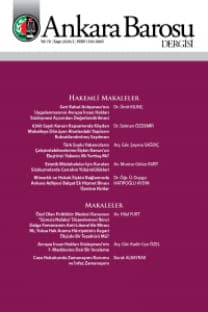Elektronik Haberleşme Hizmetlerinde Yetkilendirmenin Hukuki Niteliği
05.11.2008 tarihli ve 5809 sayılı Elektronik Haberleşme Kanunu, bildirim ve kullanım hakkının verilmesi esasına dayalı bir yetkilendirme sistemi öngörmektedir. Adı geçen yetkilendirme türleri, idari işlem kuramı yönünden incelendiğinde, bildirim suretiyle yetkilendirmenin idarenin zımnî tek yanlı işlemiyle gerçekleştiği; kullanım hakkının verilmesinde ise, açık bir idari işlemle ilgili özel kişilerin yetkilendirildiği görülmektedir. Sayısı sınırlandırılmış kullanım hakkının verilmesinde uygulanacak ihale sürecinin de, kullanım hakkı verilmesi işleminin geçerliliği üzerinde etkili olacağı açıktır. Her durumda idarenin tek yanlı işlemiyle gerçekleşen yetkilendirmenin, kamu hizmetlerinin yürütülmesi yöntemleri açısından değerlendirildiğinde ise, kamu hizmeti niteliği taşıdığında kuşku bulunmayan elektronik haberleşme hizmetleri alanında bir tür kamu hizmeti ruhsatı içerdiği söylenebilir. Bununla birlikte, devletin kamu hizmetlerinin aslî sahibi ve sorumlusu olduğu anlayışı ile elektronik haberleşme hizmetleri alanının tümüyle özel kişilere özgülenmesi keyfiyeti karşısında, kamu hizmeti ruhsatına ve devlet - kamu hizmeti ilişkisine dair klasik algılama biçiminin gözden geçirilmesi zorunludur.
Anahtar Kelimeler:
Kamu hizmeti, idari işlem, ruhsat, kamu ihalesi, regülasyon.
Legal Nature of Authorisation in Electronic Communications Services
The recently enacted Electronic Communications Act (No. 5809, 05 November 2008) provides an authorisation system based on notification and granting of rights in the domain of electronic communications services. Authorisation by notification is done by an implicit unilateral act of administration, whereas rights to use frequencies or numbers are granted by an explicit administrative act. When the number of rights to be granted is restricted, the procedure of procurement to be applied shall have its effects on the validity of the final act of granting of rights. In all cases, private persons shall be authorised by an unilateral act of administration, and considering the fact that the electronic communications services have been qualified by the legislator as “public services ”, aforementioned authorisation might be regarded as a sort of “public service licence ”. Nevertheless, it is inevitable to reconsider the classical approach to the notion of “public service licence ” and to the relations between the State and public services, bearing in mind the fact that the domain of electronic communications services is exclusively reserved to private persons whereas it is accepted that the State is ultimately in charge of public services.
Keywords:
Public service, administrative act, licence, public procurement, regulati,
- ISSN: 1300-9885
- Yayın Aralığı: Yılda 4 Sayı
- Başlangıç: 1942
- Yayıncı: Ankara Barosu Başkanlığı
Sayıdaki Diğer Makaleler
Türkiye’de Bilgi Edinme Hakkı ve Uygulama Sorunları
Zeliha ARAS, E. Baturay ALTINOK
Kiralanan Taşınmazın ‘Kira Borcunun Ödenmemesi (Temerrüt)’ Nedeniyle İlamsız İcra Yoluyla Tahliyesi
Yargıtay Kararları Işığında Icc Hakem Kararlarının Türkiye’de Tanınması ve Tenfizi
Elektronik Haberleşme Hizmetlerinde Yetkilendirmenin Hukuki Niteliği
Gözaltıların İnsan Hakları ve Demokratik Şeffaflık Çerçevesinde Denetimi
